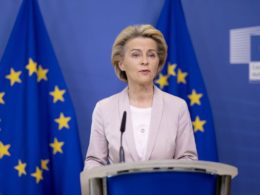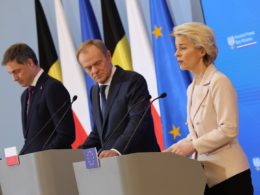The Council of Europe announced on 4 February 2025, that the European Union has laid the legal foundations for establishing a special tribunal to prosecute Russia's crime of aggression against Ukraine.
According to the statement, the tribunal will have the authority to hold Russian political and military leaders accountable for their actions. The announcement follows ongoing discussions since 2022 among over 40 countries working to hold Russia responsible for its aggression. \depo
"When Russia decided to roll its tanks over Ukraine's borders, violating the UN Charter, it committed one of the most serious violations: a crime of aggression. Now justice is coming," declared European Commission President Ursula von der Leyen.
Von der Leyen emphasized that justice "cannot come without compensation," stating, "Russia must be held accountable for its aggression, and it must pay."
The Council of Europe's Secretary General, Alen Berset, hailed the progress made in establishing the special tribunal as substantial and welcomed this "big step" towards its creation.
Leading legal experts from EU institutions have also formulated key elements of the "Schuman project" – the primary legal text that will govern the special tribunal's functioning.
The special tribunal will be established through an agreement between the Ukrainian government and the Council of Europe. The European Commission and EU High Representative for Foreign Affairs Kaja Kallas welcomed the "big step" in holding Russia accountable for its aggressive war against Ukraine.
Kallas explained that while the International Criminal Court can prosecute war crimes, only a special tribunal can prosecute the crime of aggression. "It is clear that the crime of aggression is a leadership crime, so without the crime of aggression, there would be no war crimes. That's why it's extremely important that there is accountability for the crime of aggression as well," Kallas stated.
She also stressed the importance of "sending a signal" that unpunished crimes only encourage further aggression.
The Core Group on the establishment of the Special Tribunal for the crime of aggression against Ukraine, formed in 2023, consists of senior legal experts from approximately 40 states working with Ukrainian authorities, the EU Commission, the European External Action Service, and the Council of Europe to seek justice for Ukraine in the face of Russia's aggression.
What happened earlier:
Discussions regarding a special tribunal on the crime of aggression have been ongoing since 2022, but there has been no practical progress on this issue for a long time, as Ukraine advocates for the creation of an international tribunal (i.e., based on an international organization), while key Western allies favor a so-called hybrid format (where the tribunal takes place under Ukrainian law but with the support of international partners).
In May 2024, the Council of Europe took steps to establish the tribunal: it instructed its Secretary General to prepare documents that could potentially lead to an agreement with Ukraine on establishing a special tribunal for the crime of Russian aggression.
By January 2025, the European Parliament adopted a resolution calling for the establishment of a special tribunal to investigate acts of aggression by Russia. This resolution emphasized the need for accountability and condemned Russia's historical revisionism and denial of its crimes, including those from the Soviet era. It highlighted that these ongoing aggressions are part of a broader pattern of imperialist policies by Russia.
However, establishing a tribunal for Russian aggression faces several challenges:
- Lack of established legal framework for prosecuting the crime of aggression
- Immunity of high-ranking Russian officials under international law
- Potential escalation of tensions during an ongoing conflict
- Political resistance from nations concerned about setting precedents
- Russia's veto power in the UN Security Council complicating tribunal establishment






